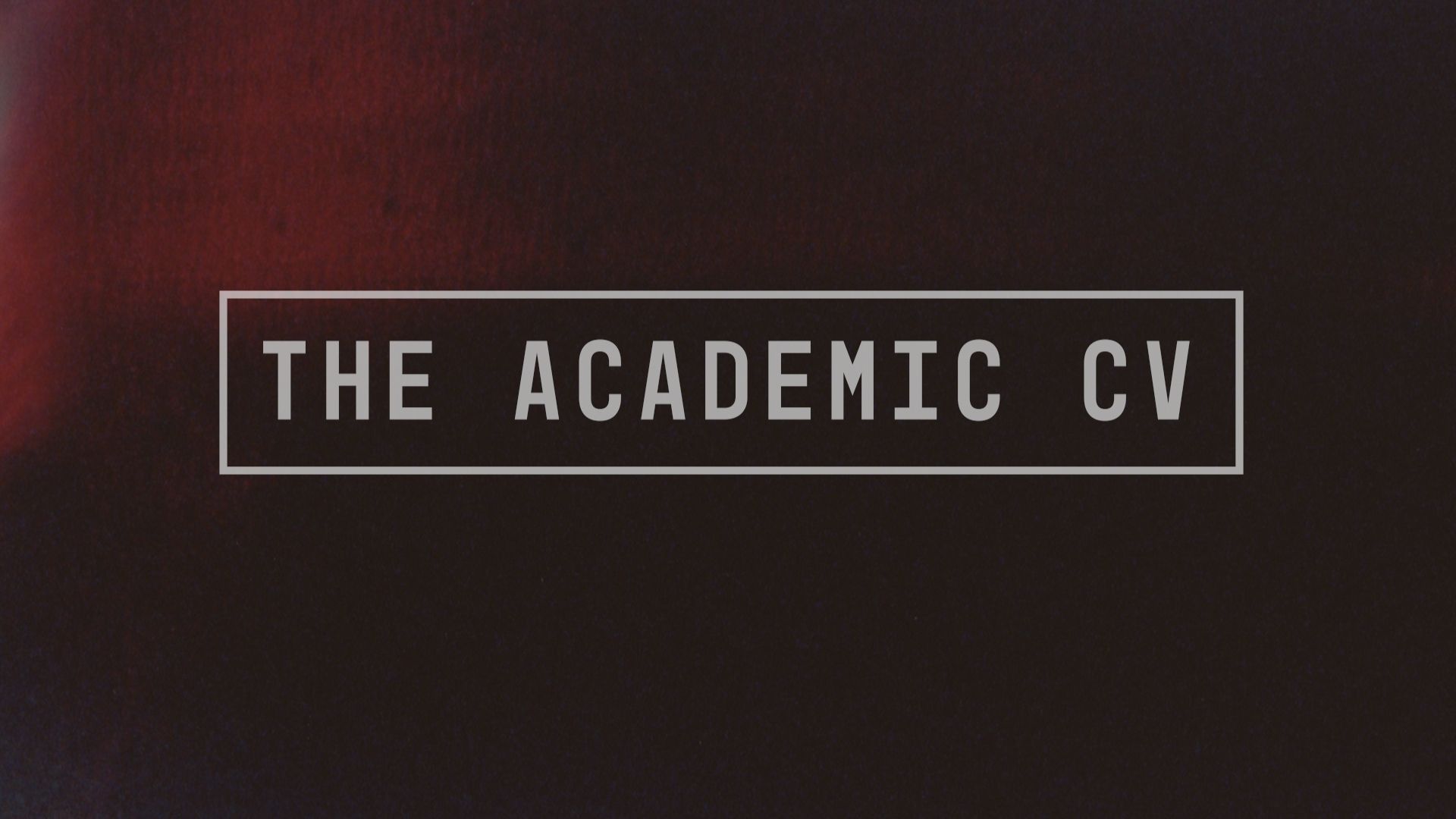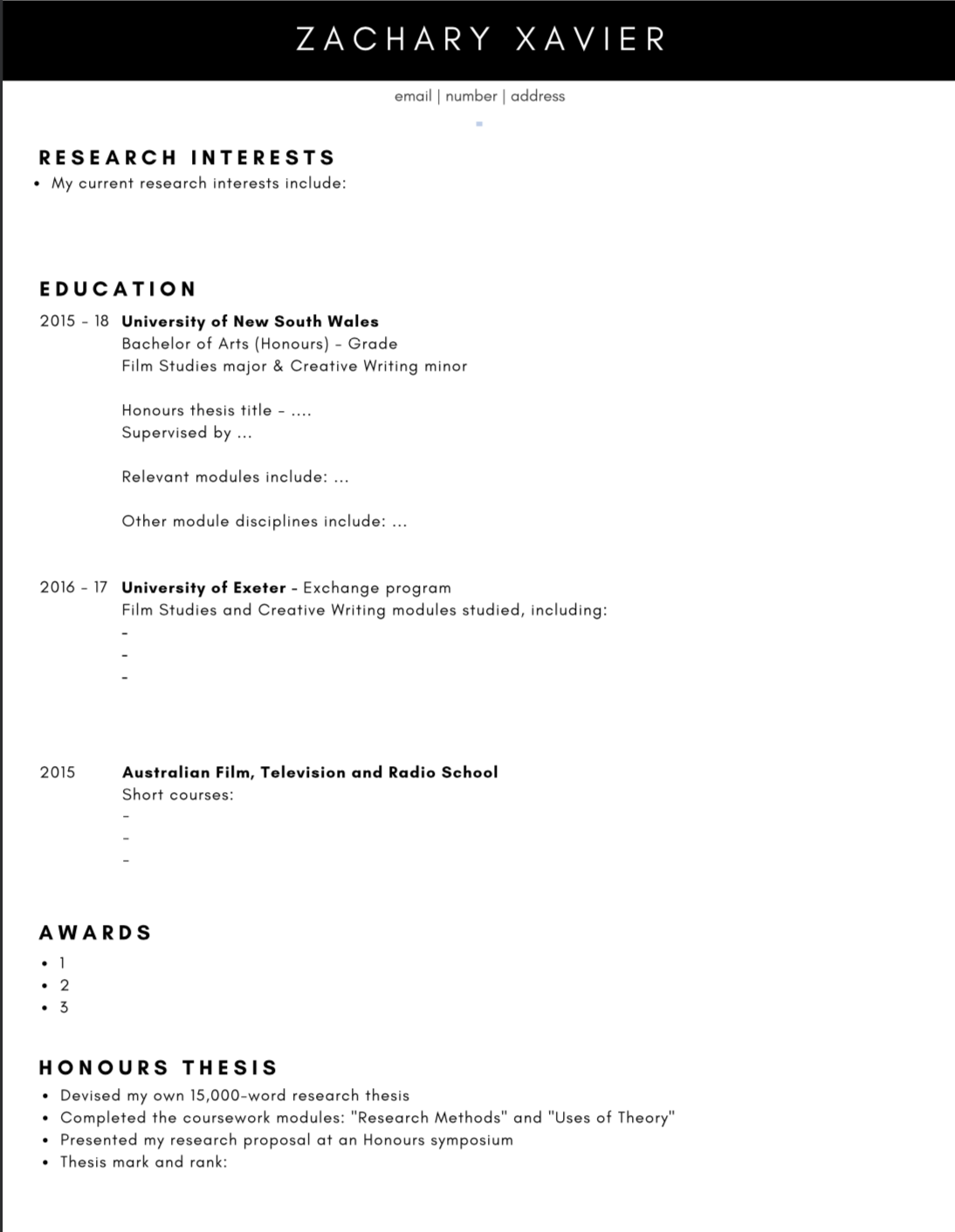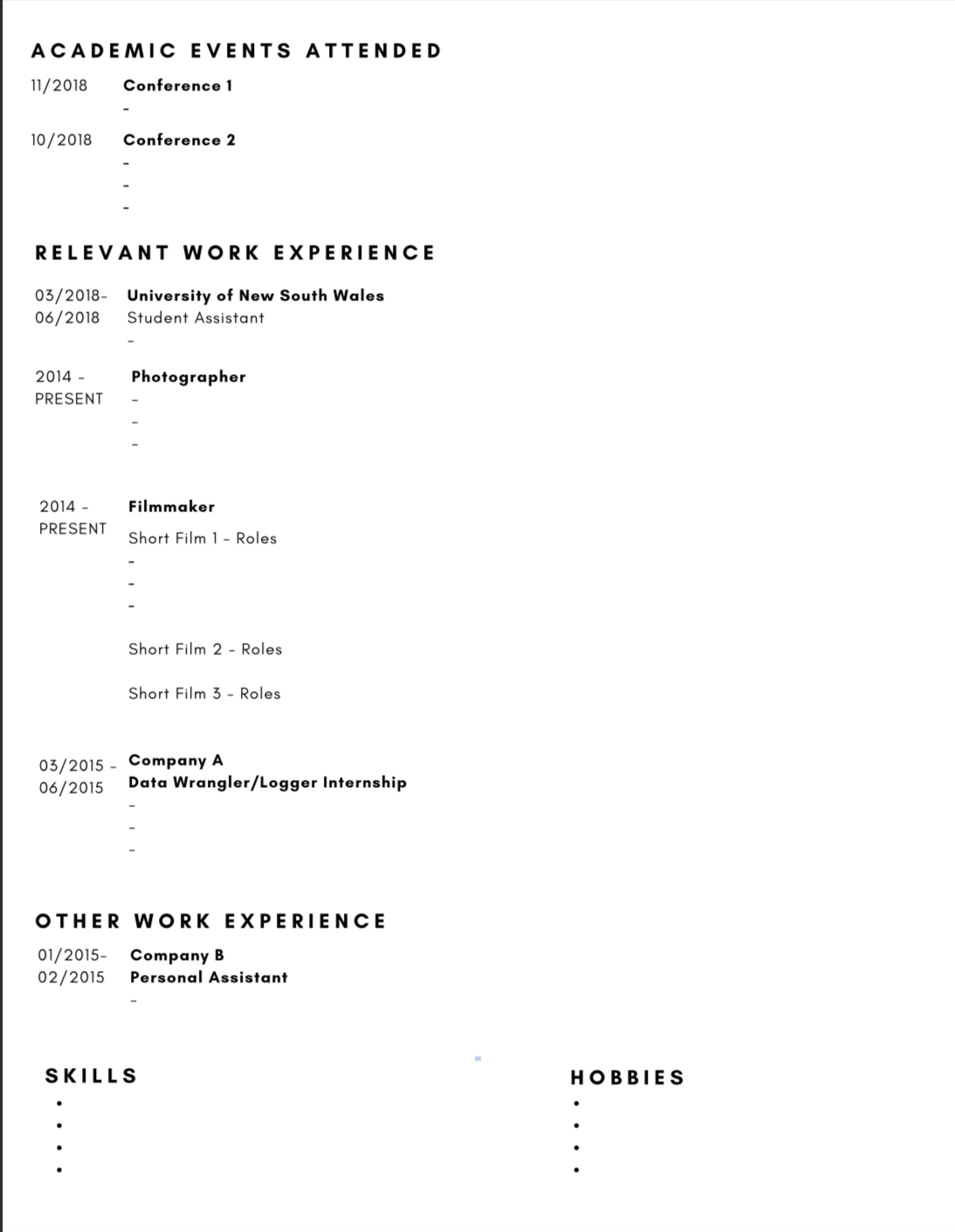Oxford's MSt in Film Aesthetics: The Academic CV
In this article, I discuss the academic CV required to apply to the MSt in Film Aesthetics at the University of Oxford, and go over my own academic CV that I used in my application.

In this article, I discuss the academic CV that is required when applying to the MSt in Film Aesthetics at the University of Oxford, and go over my own academic CV to clarify its function.
What is an academic CV, and how does it differ from a professional CV?
If you go on to the MSt in Film Aesthetics' course webpage, and navigate to the CV/résumé section under how to apply, you can get a better idea of what the admissions tutors are looking for. Under that section, it says:
"A CV/résumé is compulsory for all applications. Most applicants choose to submit a document of one to two pages highlighting their academic achievements and any relevant professional experience."
This summarises the difference between a professional CV and an academic CV. In an academic CV you should focus on your education and any academic achievements, going into more detail than you normally would in a professional CV, which would be more focused on your professional experience.
To demonstrate what I mean by that I’ll run through the academic CV that I used to apply, and hopefully that will clear up any confusion regarding this component of the application process.


My Academic CV
Research Interests
At the top of my academic CV, you can see the basic information I included like name, email, mobile number, and address. I started the CV itself with a section on my research interests. Here, I mentioned some of the areas of Film Studies that interested me most at the time of applying, such as: film-philosophy, montage theory, and the philosophy of Gilles Deleuze and Stanley Cavell. You can also include the modules of the programme that are of interest to you in particular.
Education
Following my research interests, I dive straight into a section on my education. This section took up the majority of the first page, and should contain detailed information about your academic background. At the top, I had my most recent degree, a BA (Hons), with the name of the institution I received it from, together with my overall grade, major and minor. At the time of applying, I had completed my undergraduate degree entirely so I included my Honours thesis title and the names of my supervisors. If you are applying whilst still completing your undergraduate degree, I would include as much information about the most relevant modules you are studying and, if applicable, any information about your major project that you will complete at the end of your degree.
Under my Honours thesis title, I listed all of the relevant film modules I studied. Following this, I also listed all of the additional module disciplines I studied, because in Australia you can study more than one discipline, and I thought that would be interesting to include. Underneath that I had a section on the University of Exeter, which is where I spent a year on exchange. I included the same things as above, listing out the relevant modules I studied, and the marks achieved. Following this section, I included another section on some short filmmaking courses I did at the Australian Film, Television and Radio School (AFTRS) in Sydney. This is a good example of when you can include filmmaking experience as opposed to studying film in an academic context. I included these courses here because I didn’t mention them anywhere else in my application, but thought they were still relevant to include given that they are related to film.
I didn’t include my secondary school education because I felt I had more than enough to draw from having had completed my undergraduate degree in Film Studies. Although, I do know of some people that have included their secondary school education. It might be worth mentioning if, say, you didn’t major in Film Studies at university, but did Film/Media Studies as a subject for IB/A-Levels/your country’s equivalent. It’s up to you to gauge the relevancy of your secondary education, but if you do mention it, I wouldn’t go into too much detail unless it is relevant to your current research interests – the focus should be on your tertiary education.
Awards
Moving on from the education section, you can see that I had a section on awards. At the time of applying I had been awarded 3 awards throughout my time as an undergraduate, and I listed them all here: they were all related to my academic performance. I would definitely take the opportunity here to highlight any awards you’ve earned throughout your time at university, or even secondary school, because it emphasises your ability to perform well within an academic context, and it might otherwise get lost in the other parts of the application. If you don’t have any awards, I wouldn’t worry too much – it’s not an essential part of the application.
Honours Thesis
Following the awards section, I dedicated a heading to my Honours thesis. I did this because in Australia, where I completed my undergraduate degree, Honours is an entire year on its own and is quite different to the main 3-year Bachelors prior to it. Under this section, I went into a bit more detail regarding that experience, with the goal of drawing out the research skills gained through it. For example, I mentioned that I completed a 15,000-word research thesis and completed a coursework module in research methods. I also mentioned that I presented my research proposal at an Honours symposium because it demonstrates that I’ve aware of, and taken part in, the type of events that commonly occur in an academic setting. At the end of the section, I included my thesis mark and how that ranked within my cohort because, again, I wanted to emphasise my ability to undertake an extended research project, as this is the type of assignment that the Film Aesthetics program entails.
Academic Events Attended
On the second, and final page, I started with a section on academic events I had attended. Both of these conferences were Film Studies conferences. I didn’t present any papers at them, but I was invited to attend one by my supervisor and another by other Film Studies academics. This isn’t essential to mention but, once again, I wanted to demonstrate that I was familiar with what the study and research of film within an academic context involves.
Relevant Work Experience
I separated my work experience into two distinct headings, relevant work experience and other work experience. I did this mainly to make it easier to navigate the CV: the admissions tutors can see that all of the relevant work experience is vaguely related to film and visual media in one way or another, whether it be practical filmmaking or running the screenings for a film module. Whereas, my ‘other work experience’ is less related to film, but still something I wanted to mention on the CV. Under each role I included a few bullet-points detailing the nature of the job and the types of responsibilities I had.
I want to stress that, in my opinion at least, your work experience is unlikely to determine the outcome of your application to the MSt in Film Aesthetics – the most important part of the application is your academic background and performance.
Skills and Hobbies
I ended the academic CV with a brief section on technical skills and hobbies, bullet-pointing each item.
Video
Below you can find the video version of this article. Alternatively, you can also watch this video, along with others on similar topics, at the Cinema Scholar YouTube channel.

